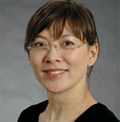 Gitte Lee-Mortensen, a medical anthropologist based in Denmark, told the European Health Forum in Gastein, Austria, that research suggests public health campaigns have given the inaccurate impression that the HPV vaccine is only useful for pre-teen and adolescent girls.
Gitte Lee-Mortensen, a medical anthropologist based in Denmark, told the European Health Forum in Gastein, Austria, that research suggests public health campaigns have given the inaccurate impression that the HPV vaccine is only useful for pre-teen and adolescent girls.
This can have a detrimental effect if authorities decide to expand immunisation programmes to include adult women or boys.
“Messages aimed to drive HPV vaccination today may act as barriers down the line so we need to weigh each word,” she said, at a Gastein workshop co-hosted by MSD and Sanofi Pasteur MSD.
Access influence uptake
Lee-Mortensen interviewed 435 women aged between 16 and 26 and found that many believed that because the vaccine was initially free in Denmark for girls aged 12 – with catch-up programmes for 13 to 15 year olds – that it was ineffective for those aged 16 and above or women who were sexually active.
“Girls and young women included in the study thought, due to the information campaign aimed at pre-sexually active girls, that the HPV vaccine wasn’t beneficial for people who are already sexually active,” she said.
Lee-Mortensen also said the inclusion of a vaccine in a national immunisation schedule makes people feel more positively about it because they know it has been reviewed and recommended by experts.
However, she warned that if a vaccine is initially rolled out only for a subgroup of the population it can cause confusion if the target group is later expanded. In the case of HPV vaccine, Denmark extended its vaccination programme to include women aged up to 26 but has not yet included boys in its recommendation.
A broader approach
Lee-Mortensen said that while HPV vaccination is recommend for boys in Canada, Australia and the US, most European countries are awaiting the view of the European Medicines Agency.
European guidelines published in September say that universal coverage with HPV vaccines could be the most effective strategy to prevent HPV-related morbidity, “provided the efficacy and safety of HPV vaccines are comparable in men and women”.
The European Centre for Disease for Disease Prevention and Control (ECDC) says that while the vaccine is effective, current economic models show that including boys in HPV vaccination programmes is not yet proven to be cost-effective. This will be kept under review as more data begins to emerge.
According to Lee-Mortensen’s research, the perception of the HPV vaccine would need to change if authorities recommend that that the immunisation programme be expanded.
“We need to change the perception of HPV vaccine as a girls-only vaccine, and move towards presenting it as a vaccination for both genders. It might also be wise to remove the focus on Sexually Transmitted Infections (STIs) to show that it’s a common virus that almost everybody comes into contact with during their lifetime,” she said.
Dr Ian Banks of Men’s Health Forum said boys should be vaccinated against HPV. “It’s an inequality issue. It’s not just that by vaccination boys we may protect women – in the way we vaccinate mothers to protect newborns – it prevents cancer in men. We need to view HPV as not just an issue for girls but an issue for boys too,” he said.
Dr Suzanne Suggs, head of the BeCHANGE research group at the University of Lugano in Switzerland, said making the HPV vaccination free and easily available – in schools, clinics or other locations – can have a major positive influence on uptake.
She suggested reframing the discussion of HPV as a cancer prevention campaign rather than getting bogged down in a debate about preventing sexually-transmitted infections (STIs) – a subject which has been a source of controversy in some instances where parents are reluctant to contemplate vaccinating 12-year-olds against STIs.





Rodrigo Schmidt
January 2nd, 2013
It’s a good thing that we already have developed a vaccine that would protect us from HPV. We should have ourselves vaccinated.